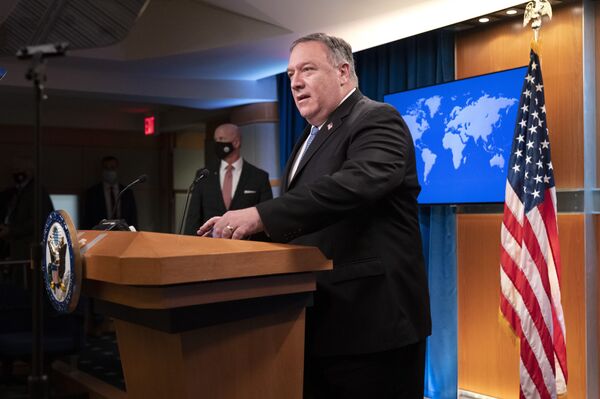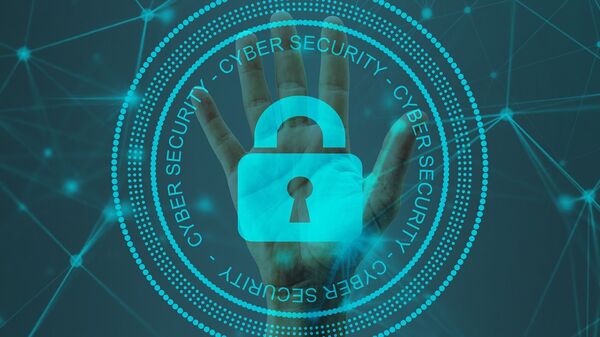While US Secretary of State Mike Pompeo groundlessly linked the alleged hacking campaign against American government agencies to Russia on The Mark Levin Show, the White House has backed away from issuing a statement condemning Moscow. President Donald Trump accused the "lamestream media" of inflating the real impact of the supposed intrusion and threw the "Russia did it" narrative into question, while at the same time pointing the finger at China. However, no evidence implicating Moscow, or Beijing, or any other specific actor, has ever been presented to back the claims.
'How Do We Know That a Cyber Attack Occurred?'
It’s no secret that when it comes to interactions via Internet services, it is by nature hard to prove the original intentions and true identities of the so-called intruders, says Dr Ching Chang, a research fellow at Taiwan’s Society for Strategic Studies in Taipei.
"It is always hard to verify the true identities of Internet intruders who conducted the cyberattacks even after these manoeuvres in cyberspace can be confirmed", he explains. "Whether the hackers can be defined as premeditated operations directed by official authorities, or alternatively, should be perceived as hostile probing made by unknown users only may prove how responsible the legal authorities and law enforcement agencies actually are".
Furthermore, no one can say for sure that the "intrusion" really happened, as there have been many false alarms about cyberattacks occurring before, according to the researcher.
"The process of the Internet service is basically interactive", he explains. "As a website is accessed by users from other networks or terminals, it would be necessary to acquire proper information before the website allows the external users to access its informational services. Whether these interactions can be defined as proper usages, probes or even attacks is literally quite controversial".
Given this, without solid evidence, "all the accusations of foreign cyberattacks are nothing else but plausible speculations", Ching Chang stresses, blasting the "imprecise descriptions such as 'linked to Moscow or related to Beijing'" floated by American politicians and the mainstream media as "fundamentally misleading".
The mainstream media fuss over the supposed hack with no evidence being provided has triggered a lot of questions, says Dr Paul Craig Roberts, an American economist and former assistant secretary of the Treasury for economic policy under President Ronald Reagan.
"How do we know that an attack occurred?" he asks. "Is there any evidence? Why would the Russian government bother? Was it just a private hack by kids having fun?"

Timing of the Alleged Hack
The timing of the "disclosure" concerning the alleged cyber-attack speaks volumes, according to Stephen B. Presser, an emeritus professor of legal history at the Chicago-based Northwestern University School of Law.
"It certainly seems more than coincidental that when there is suddenly increased media attention on the infiltration by the Chinese (e.g. the 'honeypot' trap involving Congressman Swalwell, the Biden-family Chinese contacts) we have reports of Russia allegedly hacking our computers", the academic suggests, referring to Democratic House Representative Eric Swalwell's ties with alleged Chinese spy Fang Fang, reported by Axios earlier this month, and the FBI's ongoing probe into President-elect Joe Biden's son Hunter Biden.
The professor further presumes that the "hacking" story also deflects attention from our social media, such as Facebook and Twitter, "which have perhaps not been as politically objective as they have claimed to be and risk losing the protection against the libel laws which federal law now gives them". In mid-November, the two Silicon Valley giants testified before the US Congress on alleged anti-conservative bias and their attempts to censor the president over his statements about suspected election fraud.
Great monologue by @seanhannity highlighting the #BigTech censorship concerns I raised yesterday at our @senjudiciary hearing with @twitter & @facebook.
— Senator Ted Cruz (@SenTedCruz) November 18, 2020
Big Tech cannot be a publisher AND take advantage of special benefits under #Section230 -- that’s not how this works. pic.twitter.com/9IFY8lqvhu
Big Tech's apparent partisan approach prompted President Trump to call for stripping them of the protections provided by Section 230 of the Communications Decency Act of 1996. As US congressmen failed to insert the aforementioned provision in the bipartisan National Defence Authorisation Act (NDAA), the president vowed to veto the bill.
US Establishment Needs 'a Major Enemy'
Apart from distracting the public's attention from obvious domestic controversies, the US establishment and the military industrial complex "needs a major enemy", notes Dr Roberts.
"Russia fills the bill", the economist says. "To keep funding flowing to the defence industries there will be periodic hypes of 'the threat'. The threat hype is also useful in keeping NATO in line. The threat will move about. The Russian government should understand that its role is to be the threat that focuses Americans’ attention off of the threat their own government and globalism present to their civil liberty and economic wellbeing".
However, it is somewhat ludicrous that the list of US "enemies" is limited to Russia and China, highlights Ching Chang, adding that Washington "does need a much longer list of suspects when any cyberattack actually happened".
"Given the fact that there are so many parties, existing domestically and internationally, are quite hostile to various governmental agencies in the United States… to put the focus on Moscow and Beijing will be extremely unwise", he says. "The United States has more adversaries than it would like to have and could imagine. To cease those useless wild guesses and pay more efforts to find the true origins of threats will be a more constructive approach to the national security of the United States".




